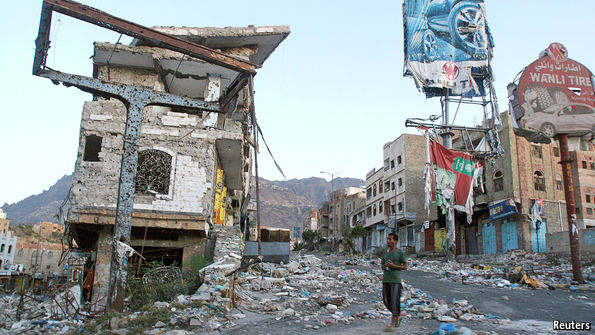
AS IS the way of the Middle East, when a ceasefire beckons the fighting intensifies, as the fighters try to press their advantage before the jaw-jaw begins. No sooner had Saudi Arabia talked last week of halting the year-long bombardment of its much poorer neighbour than its air strikes on Yemen resumed. The UN mediator, Ismail Ould Cheikh Ahmed, could barely scramble from Sana’a before the capital was struck. Another hundred Yemenis were killed when bombs struck a market in Hajja, a town near the Saudi border. Further south, the armed Shia group known as the Houthis, which seized the capital along with much of the country in 2014, continued shelling Taiz, a predominantly Sunni city.
The deaths will probably change little. The battle lines have stayed stubbornly fixed for months. Both sides seem aware that a military victory is out of reach. After a year of bombings, bombs lose their impact. “We forget them in minutes,” says a nonchalant Yemeni. In Sana’a the old city’s once-empty alleyways are crowded again. Somehow markets are full. The electricity grid is entirely down, but a surfeit of solar panels has entered the country. Saudi-backed fighters claim to have lifted the Houthis’ siege of Taiz, but coalition ground-forces seem loth to advance on the capital or the Houthi strongholds further north. And the administration the Saudis have tried to re-establish in Aden, the southern port, is dysfunctional and prone to attack from al-Qaeda. The Emiratis, who play second fiddle to the Saudis, are said to have stopped their patrols.
Still, preliminary talks are stumbling on. The warring parties are now negotiating directly in Saudi Arabia. Some ten days of meetings led by the Houthi spokesman, Muhammad Abdelsalem, have so far resulted in a cessation of cross-border fighting and Houthi shelling of Saudi border towns, as well as a prisoner swap. Saudi advisers speak of following Russia’s example by grounding most of their warplanes.
The broad outlines of a political deal, too, seem to be slowly taking shape. The Houthis could offer the government in Aden a refuge in Sana’a, where it would be safe from al-Qaeda. In return the Houthis would gain several key ministries and see their militiamen taken onto the government payroll. The Saudis could claim that they have stopped another neighbouring capital from falling into the hands of Iranian clients,while the Houthis could formalise their presence at the heart of government, much like Hizbullah in Lebanon.
Such, at least, is the road map. In reality, Yemen is too battered for anything resembling coherence or functioning central government to be quickly re-established. So the population will continue to suffer. In the Arab world’s poorest state, war has cut incomes by almost half. Some 2.5m people have been displaced; around 6,000 killed. The UN says a third of the country’s 21m people are in severe need of food. Other than spur Yemeni loathing for Saudi Arabia, the war has achieved little.